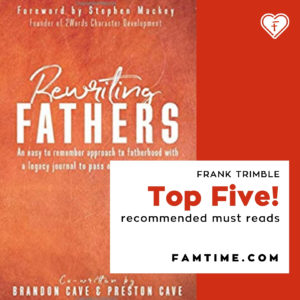
Rewriting Fathers by Brandon Cave and Preston Cave
If I’m honest, it has always been hard for me to get excited about books that are targeted to fathers. I love the topic, but so many of the books, I see on the shelves, seem to market ideas that don’t really have much to do with how I think or what I need. However, my friend Preston Cave and his brother Brandon co-authored a book in 2019 called “Rewriting Fathers: An Easy to Remember Approach to Fatherhood with a Legacy Journal to Pass on to Your Children” and I’m thankful they did. It is very practical and gives memorable ways to implement strategies within the home that will lead families to flourish.
As always, it was tough to narrow the search to five, but here are my Top 5 quotes from this helpful book:
1. “The real truth about the effects of fathers on life is that we are extremely important to the physical, emotional, mental, and spiritual development of our sons and daughters.” (1)
2. “Did you realize that parents have about 3,000 hours per year with their children? Compare this to the 40-50 hours per year the church has with the average student. Which institution do you think has the greatest potential for influence? For better or worse, the family has so much more potential impact. So, let’s regularly find ways to be faithful to our family.” (7)
3. “The healthiest fathers I have encountered are the dads that know when to work and when to stop working.” (15)
4. “Fathers may be the spiritual leader of the home, but we need to always remain teachable to the different members of our family so we can effectively lead them well.” (20)
5. “We are called to be like our Heavenly Father as much as humanly possible. We will be a picture to our children of what God is like, so let’s take this calling of fatherhood seriously!” (36)
I love the book’s practical approach and I love the freedom the authors give dads in the area of growing as fathers. Many men’s ministry resources condemn fathers for their poor performance. This book doesn’t condemn, but provides biblical challenges to fathers while also encouraging them to set goals for themselves.
However, one of the greatest features of this book is the “Legacy Journal” found in the ninth chapter. The authors give a short introduction which serves as a great rationale for fathers to participate in the ancient practice of journaling. Then, they provide blank pages with prompt questions that fathers can use to write down information about their stories in order to pass the information down to their children and grandchildren. I’ve heard men make fun of journaling, but after reading this book, I know that I will begin filling out these pages, so that my family knows as much information about me as possible. This is not meant to glorify the self, but rather to show them how merciful and gracious God has been to me. Our kids need to know our stories. Don’t leave them wishing they had more information after you’re gone.
